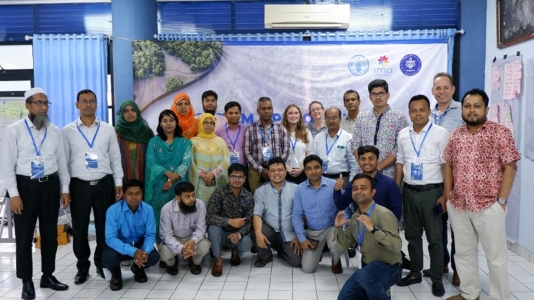20 Bangladeshis Participate in EAFM and Climate Change Training at the Department of MSP FPIK IPB University

Department of Aquatic Resources Management (MSP), Faculty of Fisheries and Marine Science (FPIK) IPB University together with IMA international and Food and Agriculture Organization (FAO) has conducted Ecosystem Approach to Fisheries Management (EAFM) and Climate Change Training for 20 people from Bangladesh, 19-31/3.
Dr M Mukhlis Kamal, chairman of the committee as well as international trainer of EAFM, said this activity provides articulation to aquaculture and capture fisheries, the role of mangrove ecosystems, adaptation of ecosystems and fisheries and local communities to climate change.
Topics discussed were related to the application of EAFM and climate change aspects in fisheries management, both inland fisheries and coastal fisheries in Bangladesh.
"Specifically, the location that became the topic of discussion was Bangladesh. A total of 20 participants from this country were invited by FAO to participate in training activities," said the IPB University lecturer from the MSP Department.
Reporting from FAO, EAFM is a concept of balancing socio-economic goals in fisheries management. It includes the welfare of fishermen and fairness in the utilization of fishery resources. The EAFM concept considers aspects of knowledge, information and uncertainty about biotic, abiotic and human interaction components in aquatic ecosystems through an integrated, comprehensive and sustainable fisheries management.
Head of the MSP Department of IPB University, Prof Hefni Effendi, said that his department became the focal point in its implementation. This activity is expected to increase the exposure of the Department of MSP FPIK IPB University in the international arena.
"To increase the production of captive fisheries and to preserve the biodiversity, various approaches including fisheries management with an ecosystem approach (EAFM) need to be done," he said.
He elaborated, EAFM applies a holistic approach that recognizes all interactions in an ecosystem not only considering one species. Ecological integrity that maintains the sustainability of fish resources is managed in line with the economic benefits obtained.
"Efforts to harmonize these two aspects can be achieved through optimal participation of all stakeholders in a good governance framework," added Prof Hefni.
According to him, to maintain the sustainability of fish resources, management with an ecosystem approach is also required to integrate with a governance system that is adaptive to climate change. Climate change is changing ecosystems and fisheries in all waters of the world.
"Therefore, the decision-making framework and its implementation must accommodate and facilitate fisheries that have resilience and adaptation to climate change, which at the same time aquatic ecosystems and fisheries production are complex and multidimensional," he explained.
Other than the classroom discussions held at IPB Dramaga Campus, participants also had the opportunity to conduct a field trip to the center of fisheries activities in Karawang. This was in order to provide an overview of how coastal and marine fisheries activities are carried out in Indonesia.
Dean of FPIK IPB University, Prof Fredinan Yulianda was present to open this international training. A number of instructors involved from IPB University include Dr M Mukhlis Kamal (MSP-FPIK IPB), Prof Luky Adrianto (MSP-FPIK), Dr Taryono (MSP-FPIK), Dr Perdinan (Climate Change Study Program-Math and Natural Sciences Faculty). Also present were Dr Renny Puspasari (National Research and Innovation Agency/BRIN) and Chris Grose, Leigh Dowsett and Olivia Nagle (IMA International). (HEF/Rz) (IAAS/RUM)


